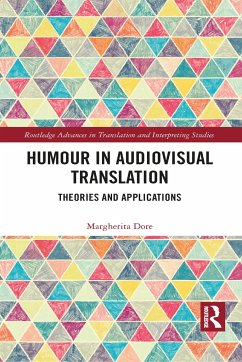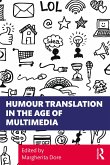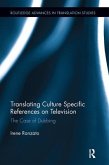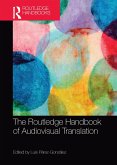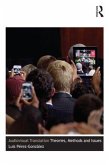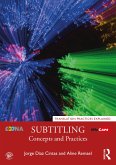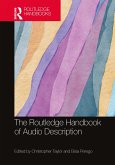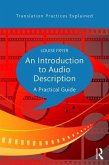- Broschiertes Buch
- Merkliste
- Auf die Merkliste
- Bewerten Bewerten
- Teilen
- Produkt teilen
- Produkterinnerung
- Produkterinnerung
This book offers a comprehensive account of the audiovisual translation (AVT) of humour, bringing together insights from translation studies and humour studies to outline the key theories underpinning this growing area of study and their applications to case studies from television and film. The volume outlines the ways in which the myriad linguistic manifestations and functions of humour make it difficult for scholars to provide a unified definition for it, an issue made more complex in the transfer of humour to audiovisual works and their translations as well as their ongoing changes in…mehr
Andere Kunden interessierten sich auch für
![Humour Translation in the Age of Multimedia Humour Translation in the Age of Multimedia]() Humour Translation in the Age of Multimedia39,99 €
Humour Translation in the Age of Multimedia39,99 €![Translating Culture Specific References on Television Translating Culture Specific References on Television]() Irene RanzatoTranslating Culture Specific References on Television51,99 €
Irene RanzatoTranslating Culture Specific References on Television51,99 €![The Routledge Handbook of Audiovisual Translation The Routledge Handbook of Audiovisual Translation]() The Routledge Handbook of Audiovisual Translation48,99 €
The Routledge Handbook of Audiovisual Translation48,99 €![Audiovisual Translation Audiovisual Translation]() Luis Perez-GonzalezAudiovisual Translation47,99 €
Luis Perez-GonzalezAudiovisual Translation47,99 €![Subtitling Subtitling]() Jorge Díaz CintasSubtitling32,99 €
Jorge Díaz CintasSubtitling32,99 €![The Routledge Handbook of Audio Description The Routledge Handbook of Audio Description]() The Routledge Handbook of Audio Description226,99 €
The Routledge Handbook of Audio Description226,99 €![An Introduction to Audio Description An Introduction to Audio Description]() Louise FryerAn Introduction to Audio Description47,99 €
Louise FryerAn Introduction to Audio Description47,99 €-
-
-
This book offers a comprehensive account of the audiovisual translation (AVT) of humour, bringing together insights from translation studies and humour studies to outline the key theories underpinning this growing area of study and their applications to case studies from television and film. The volume outlines the ways in which the myriad linguistic manifestations and functions of humour make it difficult for scholars to provide a unified definition for it, an issue made more complex in the transfer of humour to audiovisual works and their translations as well as their ongoing changes in technology. Dore brings together relevant theories from both translation studies and humour studies toward advancing research in both disciplines. Each chapter explores a key dimension of humour as it unfolds in AVT, offering brief theoretical discussions of wordplay, culture-specific references, and captioning in AVT as applied to case studies from Modern Family. A dedicated chapter to audio description, which allows the visually impaired or blind to assess a film's non-verbal content, using examples from the 2017 film the Big Sick, outlines existing research to date on this under-explored line of research and opens avenues for future study within the audiovisual translation of humour. This book is key reading for students and scholars in translation studies and humour studies.
Produktdetails
- Produktdetails
- Routledge Advances in Translation and Interpreting Studies
- Verlag: Routledge / Taylor & Francis
- Seitenzahl: 316
- Erscheinungstermin: 2. August 2021
- Englisch
- Abmessung: 229mm x 152mm x 17mm
- Gewicht: 435g
- ISBN-13: 9781032082219
- ISBN-10: 1032082216
- Artikelnr.: 62152428
- Herstellerkennzeichnung
- Libri GmbH
- Europaallee 1
- 36244 Bad Hersfeld
- gpsr@libri.de
- Routledge Advances in Translation and Interpreting Studies
- Verlag: Routledge / Taylor & Francis
- Seitenzahl: 316
- Erscheinungstermin: 2. August 2021
- Englisch
- Abmessung: 229mm x 152mm x 17mm
- Gewicht: 435g
- ISBN-13: 9781032082219
- ISBN-10: 1032082216
- Artikelnr.: 62152428
- Herstellerkennzeichnung
- Libri GmbH
- Europaallee 1
- 36244 Bad Hersfeld
- gpsr@libri.de
Margherita Dore is Adjunct Lecturer at the University of Rome 'La Sapienza' and the University of Rome 'Tor Vergata'. She (co-)authored over fifteen papers and edited one essay collection on translation practice (Achieving Consilience. Translation Theories and Practice, Cambridge Scholars Publisher, 2016), a special issue of Status Quaestionis on retranslation (2018) and one special issue of the European Journal of Humour Research on multilingual humour and translation (2019). Margherita Dore has worked on the analysis of humour in translated audiovisual texts and in a range of other contexts, including stand-up comedy.
Table of Contents
Humour in Audiovisual Translation: Theories and Applications
Table of Contents
List of Acronyms
Figures
Tables
Acknowledgements
Introduction
The Scope of This Book and its Structure
PART I - Theories
Chapter 1 - Humour and Humour Translation
1.1 Introduction
1.2 Defining Humour and its Markers
1.3 Theories of Humour
1.4 Script-based Theories
1.4.1 SSTH and GTVH
1.4.2 The Application of the GTVH and Some Criticism
1.5 Conversational Humour
1.5.1 Function(s) of Humour in Conversation
1.6 Humour in Comedy
1.7 On Humour (Un)Translatability
1.8 Summing up
Bibliography
Films, TV Series and Theatre Plays Cited
Notes
Chapter 2 - Audiovisual Translation and Humour
2.1 Introduction
2.2 AVT - Reasons and Rationale
2.3 Some Theoretical Considerations Regarding AVT
2.4 Modes of Audiovisual Translation
2.4.1 Revoicing
2.4.1.1 Dubbing
2.4.2 Captioning
2.4.2.1 Subtitling and Fansubbing
2.5 AVT in Italy
2.6 The AVT of Humour
2.6.1 Priorities and Strategies in the AVT of Humour
2.7 Summing up
Bibliography
Films, TV Series and Theatre Plays Cited
Notes
PART II - Applications
Chapter 3 - Humorous Puns in Translation
3.1 Introduction
3.2 Defining (Humorous) Puns
3.2.1 Puns Based on Fixed Expressions and Idioms
3.2.2 Puns Based on Verbal and Non-Verbal Text
3.3 Punning and Translation
3.3.1 A Taxonomy for the AVT of Humorous Puns
3.4 Data and Methodology
3.4.1 Modern Family
3.4.2 Methodology
3.5 Data Analysis
3.5.1 Punning in Dubbing
3.5.2 Punning in Captioning
3.5.3 FEI-Based Puns in Dubbing
3.5.4 FEI-Based Puns in Captioning
3.5.5 Puns Based on Verbal and Non-Verbal Text in Dubbing and Captioning
3.6 Findings and Conclusions
Bibliography
Films, TV Series and Theatre Plays Cited
Notes
Chapter 4 - Humorous Culture-Specific References
4.1 Introduction
4.2 Defining Culture-Specific References (CSRs)
4.3 Types and Sources of CSRs
4.4 Function(s) of Humorous CSRs
4.5 Translating (Humorous) CSRs
4.6. Data Analysis
4.6.1 Dubbing Humorous CSRs
4.6.2 Captioning Humorous CSRs
4.7 Findings and Conclusions
Bibliography
Films, TV Series and Theatre Plays Cited
Chapter 5 - Multilingual Humour in AVT
5.1 Introduction
5.2 Multilingualism in AVT
5.3 Translating Multilingual Humour
5.4 Data Analysis
5.4.1 Dubbing Multilingual Humour
5.4.2 Captioning Multilingual Humour
5.5 Findings and Conclusions
Bibliography
Films, TV Series and Theatre Plays Cited
Notes
Chapter 6 - The Audio Description of Humour
6.1 Introduction
6.2 Audio Description
6.3 Hum
Humour in Audiovisual Translation: Theories and Applications
Table of Contents
List of Acronyms
Figures
Tables
Acknowledgements
Introduction
The Scope of This Book and its Structure
PART I - Theories
Chapter 1 - Humour and Humour Translation
1.1 Introduction
1.2 Defining Humour and its Markers
1.3 Theories of Humour
1.4 Script-based Theories
1.4.1 SSTH and GTVH
1.4.2 The Application of the GTVH and Some Criticism
1.5 Conversational Humour
1.5.1 Function(s) of Humour in Conversation
1.6 Humour in Comedy
1.7 On Humour (Un)Translatability
1.8 Summing up
Bibliography
Films, TV Series and Theatre Plays Cited
Notes
Chapter 2 - Audiovisual Translation and Humour
2.1 Introduction
2.2 AVT - Reasons and Rationale
2.3 Some Theoretical Considerations Regarding AVT
2.4 Modes of Audiovisual Translation
2.4.1 Revoicing
2.4.1.1 Dubbing
2.4.2 Captioning
2.4.2.1 Subtitling and Fansubbing
2.5 AVT in Italy
2.6 The AVT of Humour
2.6.1 Priorities and Strategies in the AVT of Humour
2.7 Summing up
Bibliography
Films, TV Series and Theatre Plays Cited
Notes
PART II - Applications
Chapter 3 - Humorous Puns in Translation
3.1 Introduction
3.2 Defining (Humorous) Puns
3.2.1 Puns Based on Fixed Expressions and Idioms
3.2.2 Puns Based on Verbal and Non-Verbal Text
3.3 Punning and Translation
3.3.1 A Taxonomy for the AVT of Humorous Puns
3.4 Data and Methodology
3.4.1 Modern Family
3.4.2 Methodology
3.5 Data Analysis
3.5.1 Punning in Dubbing
3.5.2 Punning in Captioning
3.5.3 FEI-Based Puns in Dubbing
3.5.4 FEI-Based Puns in Captioning
3.5.5 Puns Based on Verbal and Non-Verbal Text in Dubbing and Captioning
3.6 Findings and Conclusions
Bibliography
Films, TV Series and Theatre Plays Cited
Notes
Chapter 4 - Humorous Culture-Specific References
4.1 Introduction
4.2 Defining Culture-Specific References (CSRs)
4.3 Types and Sources of CSRs
4.4 Function(s) of Humorous CSRs
4.5 Translating (Humorous) CSRs
4.6. Data Analysis
4.6.1 Dubbing Humorous CSRs
4.6.2 Captioning Humorous CSRs
4.7 Findings and Conclusions
Bibliography
Films, TV Series and Theatre Plays Cited
Chapter 5 - Multilingual Humour in AVT
5.1 Introduction
5.2 Multilingualism in AVT
5.3 Translating Multilingual Humour
5.4 Data Analysis
5.4.1 Dubbing Multilingual Humour
5.4.2 Captioning Multilingual Humour
5.5 Findings and Conclusions
Bibliography
Films, TV Series and Theatre Plays Cited
Notes
Chapter 6 - The Audio Description of Humour
6.1 Introduction
6.2 Audio Description
6.3 Hum
Table of Contents
Humour in Audiovisual Translation: Theories and Applications
Table of Contents
List of Acronyms
Figures
Tables
Acknowledgements
Introduction
The Scope of This Book and its Structure
PART I - Theories
Chapter 1 - Humour and Humour Translation
1.1 Introduction
1.2 Defining Humour and its Markers
1.3 Theories of Humour
1.4 Script-based Theories
1.4.1 SSTH and GTVH
1.4.2 The Application of the GTVH and Some Criticism
1.5 Conversational Humour
1.5.1 Function(s) of Humour in Conversation
1.6 Humour in Comedy
1.7 On Humour (Un)Translatability
1.8 Summing up
Bibliography
Films, TV Series and Theatre Plays Cited
Notes
Chapter 2 - Audiovisual Translation and Humour
2.1 Introduction
2.2 AVT - Reasons and Rationale
2.3 Some Theoretical Considerations Regarding AVT
2.4 Modes of Audiovisual Translation
2.4.1 Revoicing
2.4.1.1 Dubbing
2.4.2 Captioning
2.4.2.1 Subtitling and Fansubbing
2.5 AVT in Italy
2.6 The AVT of Humour
2.6.1 Priorities and Strategies in the AVT of Humour
2.7 Summing up
Bibliography
Films, TV Series and Theatre Plays Cited
Notes
PART II - Applications
Chapter 3 - Humorous Puns in Translation
3.1 Introduction
3.2 Defining (Humorous) Puns
3.2.1 Puns Based on Fixed Expressions and Idioms
3.2.2 Puns Based on Verbal and Non-Verbal Text
3.3 Punning and Translation
3.3.1 A Taxonomy for the AVT of Humorous Puns
3.4 Data and Methodology
3.4.1 Modern Family
3.4.2 Methodology
3.5 Data Analysis
3.5.1 Punning in Dubbing
3.5.2 Punning in Captioning
3.5.3 FEI-Based Puns in Dubbing
3.5.4 FEI-Based Puns in Captioning
3.5.5 Puns Based on Verbal and Non-Verbal Text in Dubbing and Captioning
3.6 Findings and Conclusions
Bibliography
Films, TV Series and Theatre Plays Cited
Notes
Chapter 4 - Humorous Culture-Specific References
4.1 Introduction
4.2 Defining Culture-Specific References (CSRs)
4.3 Types and Sources of CSRs
4.4 Function(s) of Humorous CSRs
4.5 Translating (Humorous) CSRs
4.6. Data Analysis
4.6.1 Dubbing Humorous CSRs
4.6.2 Captioning Humorous CSRs
4.7 Findings and Conclusions
Bibliography
Films, TV Series and Theatre Plays Cited
Chapter 5 - Multilingual Humour in AVT
5.1 Introduction
5.2 Multilingualism in AVT
5.3 Translating Multilingual Humour
5.4 Data Analysis
5.4.1 Dubbing Multilingual Humour
5.4.2 Captioning Multilingual Humour
5.5 Findings and Conclusions
Bibliography
Films, TV Series and Theatre Plays Cited
Notes
Chapter 6 - The Audio Description of Humour
6.1 Introduction
6.2 Audio Description
6.3 Humour in Audio Description
6.4 Data Analysis
6.5 Findings and Conclusions
Bibliography
Films, TV Series and Theatre Plays Cited
Notes
Chapter 7 - Conclusions
Bibliography
Films, TV Series and Theatre Plays Cited
Humour in Audiovisual Translation: Theories and Applications
Table of Contents
List of Acronyms
Figures
Tables
Acknowledgements
Introduction
The Scope of This Book and its Structure
PART I - Theories
Chapter 1 - Humour and Humour Translation
1.1 Introduction
1.2 Defining Humour and its Markers
1.3 Theories of Humour
1.4 Script-based Theories
1.4.1 SSTH and GTVH
1.4.2 The Application of the GTVH and Some Criticism
1.5 Conversational Humour
1.5.1 Function(s) of Humour in Conversation
1.6 Humour in Comedy
1.7 On Humour (Un)Translatability
1.8 Summing up
Bibliography
Films, TV Series and Theatre Plays Cited
Notes
Chapter 2 - Audiovisual Translation and Humour
2.1 Introduction
2.2 AVT - Reasons and Rationale
2.3 Some Theoretical Considerations Regarding AVT
2.4 Modes of Audiovisual Translation
2.4.1 Revoicing
2.4.1.1 Dubbing
2.4.2 Captioning
2.4.2.1 Subtitling and Fansubbing
2.5 AVT in Italy
2.6 The AVT of Humour
2.6.1 Priorities and Strategies in the AVT of Humour
2.7 Summing up
Bibliography
Films, TV Series and Theatre Plays Cited
Notes
PART II - Applications
Chapter 3 - Humorous Puns in Translation
3.1 Introduction
3.2 Defining (Humorous) Puns
3.2.1 Puns Based on Fixed Expressions and Idioms
3.2.2 Puns Based on Verbal and Non-Verbal Text
3.3 Punning and Translation
3.3.1 A Taxonomy for the AVT of Humorous Puns
3.4 Data and Methodology
3.4.1 Modern Family
3.4.2 Methodology
3.5 Data Analysis
3.5.1 Punning in Dubbing
3.5.2 Punning in Captioning
3.5.3 FEI-Based Puns in Dubbing
3.5.4 FEI-Based Puns in Captioning
3.5.5 Puns Based on Verbal and Non-Verbal Text in Dubbing and Captioning
3.6 Findings and Conclusions
Bibliography
Films, TV Series and Theatre Plays Cited
Notes
Chapter 4 - Humorous Culture-Specific References
4.1 Introduction
4.2 Defining Culture-Specific References (CSRs)
4.3 Types and Sources of CSRs
4.4 Function(s) of Humorous CSRs
4.5 Translating (Humorous) CSRs
4.6. Data Analysis
4.6.1 Dubbing Humorous CSRs
4.6.2 Captioning Humorous CSRs
4.7 Findings and Conclusions
Bibliography
Films, TV Series and Theatre Plays Cited
Chapter 5 - Multilingual Humour in AVT
5.1 Introduction
5.2 Multilingualism in AVT
5.3 Translating Multilingual Humour
5.4 Data Analysis
5.4.1 Dubbing Multilingual Humour
5.4.2 Captioning Multilingual Humour
5.5 Findings and Conclusions
Bibliography
Films, TV Series and Theatre Plays Cited
Notes
Chapter 6 - The Audio Description of Humour
6.1 Introduction
6.2 Audio Description
6.3 Humour in Audio Description
6.4 Data Analysis
6.5 Findings and Conclusions
Bibliography
Films, TV Series and Theatre Plays Cited
Notes
Chapter 7 - Conclusions
Bibliography
Films, TV Series and Theatre Plays Cited
Table of Contents
Humour in Audiovisual Translation: Theories and Applications
Table of Contents
List of Acronyms
Figures
Tables
Acknowledgements
Introduction
The Scope of This Book and its Structure
PART I - Theories
Chapter 1 - Humour and Humour Translation
1.1 Introduction
1.2 Defining Humour and its Markers
1.3 Theories of Humour
1.4 Script-based Theories
1.4.1 SSTH and GTVH
1.4.2 The Application of the GTVH and Some Criticism
1.5 Conversational Humour
1.5.1 Function(s) of Humour in Conversation
1.6 Humour in Comedy
1.7 On Humour (Un)Translatability
1.8 Summing up
Bibliography
Films, TV Series and Theatre Plays Cited
Notes
Chapter 2 - Audiovisual Translation and Humour
2.1 Introduction
2.2 AVT - Reasons and Rationale
2.3 Some Theoretical Considerations Regarding AVT
2.4 Modes of Audiovisual Translation
2.4.1 Revoicing
2.4.1.1 Dubbing
2.4.2 Captioning
2.4.2.1 Subtitling and Fansubbing
2.5 AVT in Italy
2.6 The AVT of Humour
2.6.1 Priorities and Strategies in the AVT of Humour
2.7 Summing up
Bibliography
Films, TV Series and Theatre Plays Cited
Notes
PART II - Applications
Chapter 3 - Humorous Puns in Translation
3.1 Introduction
3.2 Defining (Humorous) Puns
3.2.1 Puns Based on Fixed Expressions and Idioms
3.2.2 Puns Based on Verbal and Non-Verbal Text
3.3 Punning and Translation
3.3.1 A Taxonomy for the AVT of Humorous Puns
3.4 Data and Methodology
3.4.1 Modern Family
3.4.2 Methodology
3.5 Data Analysis
3.5.1 Punning in Dubbing
3.5.2 Punning in Captioning
3.5.3 FEI-Based Puns in Dubbing
3.5.4 FEI-Based Puns in Captioning
3.5.5 Puns Based on Verbal and Non-Verbal Text in Dubbing and Captioning
3.6 Findings and Conclusions
Bibliography
Films, TV Series and Theatre Plays Cited
Notes
Chapter 4 - Humorous Culture-Specific References
4.1 Introduction
4.2 Defining Culture-Specific References (CSRs)
4.3 Types and Sources of CSRs
4.4 Function(s) of Humorous CSRs
4.5 Translating (Humorous) CSRs
4.6. Data Analysis
4.6.1 Dubbing Humorous CSRs
4.6.2 Captioning Humorous CSRs
4.7 Findings and Conclusions
Bibliography
Films, TV Series and Theatre Plays Cited
Chapter 5 - Multilingual Humour in AVT
5.1 Introduction
5.2 Multilingualism in AVT
5.3 Translating Multilingual Humour
5.4 Data Analysis
5.4.1 Dubbing Multilingual Humour
5.4.2 Captioning Multilingual Humour
5.5 Findings and Conclusions
Bibliography
Films, TV Series and Theatre Plays Cited
Notes
Chapter 6 - The Audio Description of Humour
6.1 Introduction
6.2 Audio Description
6.3 Hum
Humour in Audiovisual Translation: Theories and Applications
Table of Contents
List of Acronyms
Figures
Tables
Acknowledgements
Introduction
The Scope of This Book and its Structure
PART I - Theories
Chapter 1 - Humour and Humour Translation
1.1 Introduction
1.2 Defining Humour and its Markers
1.3 Theories of Humour
1.4 Script-based Theories
1.4.1 SSTH and GTVH
1.4.2 The Application of the GTVH and Some Criticism
1.5 Conversational Humour
1.5.1 Function(s) of Humour in Conversation
1.6 Humour in Comedy
1.7 On Humour (Un)Translatability
1.8 Summing up
Bibliography
Films, TV Series and Theatre Plays Cited
Notes
Chapter 2 - Audiovisual Translation and Humour
2.1 Introduction
2.2 AVT - Reasons and Rationale
2.3 Some Theoretical Considerations Regarding AVT
2.4 Modes of Audiovisual Translation
2.4.1 Revoicing
2.4.1.1 Dubbing
2.4.2 Captioning
2.4.2.1 Subtitling and Fansubbing
2.5 AVT in Italy
2.6 The AVT of Humour
2.6.1 Priorities and Strategies in the AVT of Humour
2.7 Summing up
Bibliography
Films, TV Series and Theatre Plays Cited
Notes
PART II - Applications
Chapter 3 - Humorous Puns in Translation
3.1 Introduction
3.2 Defining (Humorous) Puns
3.2.1 Puns Based on Fixed Expressions and Idioms
3.2.2 Puns Based on Verbal and Non-Verbal Text
3.3 Punning and Translation
3.3.1 A Taxonomy for the AVT of Humorous Puns
3.4 Data and Methodology
3.4.1 Modern Family
3.4.2 Methodology
3.5 Data Analysis
3.5.1 Punning in Dubbing
3.5.2 Punning in Captioning
3.5.3 FEI-Based Puns in Dubbing
3.5.4 FEI-Based Puns in Captioning
3.5.5 Puns Based on Verbal and Non-Verbal Text in Dubbing and Captioning
3.6 Findings and Conclusions
Bibliography
Films, TV Series and Theatre Plays Cited
Notes
Chapter 4 - Humorous Culture-Specific References
4.1 Introduction
4.2 Defining Culture-Specific References (CSRs)
4.3 Types and Sources of CSRs
4.4 Function(s) of Humorous CSRs
4.5 Translating (Humorous) CSRs
4.6. Data Analysis
4.6.1 Dubbing Humorous CSRs
4.6.2 Captioning Humorous CSRs
4.7 Findings and Conclusions
Bibliography
Films, TV Series and Theatre Plays Cited
Chapter 5 - Multilingual Humour in AVT
5.1 Introduction
5.2 Multilingualism in AVT
5.3 Translating Multilingual Humour
5.4 Data Analysis
5.4.1 Dubbing Multilingual Humour
5.4.2 Captioning Multilingual Humour
5.5 Findings and Conclusions
Bibliography
Films, TV Series and Theatre Plays Cited
Notes
Chapter 6 - The Audio Description of Humour
6.1 Introduction
6.2 Audio Description
6.3 Hum
Table of Contents
Humour in Audiovisual Translation: Theories and Applications
Table of Contents
List of Acronyms
Figures
Tables
Acknowledgements
Introduction
The Scope of This Book and its Structure
PART I - Theories
Chapter 1 - Humour and Humour Translation
1.1 Introduction
1.2 Defining Humour and its Markers
1.3 Theories of Humour
1.4 Script-based Theories
1.4.1 SSTH and GTVH
1.4.2 The Application of the GTVH and Some Criticism
1.5 Conversational Humour
1.5.1 Function(s) of Humour in Conversation
1.6 Humour in Comedy
1.7 On Humour (Un)Translatability
1.8 Summing up
Bibliography
Films, TV Series and Theatre Plays Cited
Notes
Chapter 2 - Audiovisual Translation and Humour
2.1 Introduction
2.2 AVT - Reasons and Rationale
2.3 Some Theoretical Considerations Regarding AVT
2.4 Modes of Audiovisual Translation
2.4.1 Revoicing
2.4.1.1 Dubbing
2.4.2 Captioning
2.4.2.1 Subtitling and Fansubbing
2.5 AVT in Italy
2.6 The AVT of Humour
2.6.1 Priorities and Strategies in the AVT of Humour
2.7 Summing up
Bibliography
Films, TV Series and Theatre Plays Cited
Notes
PART II - Applications
Chapter 3 - Humorous Puns in Translation
3.1 Introduction
3.2 Defining (Humorous) Puns
3.2.1 Puns Based on Fixed Expressions and Idioms
3.2.2 Puns Based on Verbal and Non-Verbal Text
3.3 Punning and Translation
3.3.1 A Taxonomy for the AVT of Humorous Puns
3.4 Data and Methodology
3.4.1 Modern Family
3.4.2 Methodology
3.5 Data Analysis
3.5.1 Punning in Dubbing
3.5.2 Punning in Captioning
3.5.3 FEI-Based Puns in Dubbing
3.5.4 FEI-Based Puns in Captioning
3.5.5 Puns Based on Verbal and Non-Verbal Text in Dubbing and Captioning
3.6 Findings and Conclusions
Bibliography
Films, TV Series and Theatre Plays Cited
Notes
Chapter 4 - Humorous Culture-Specific References
4.1 Introduction
4.2 Defining Culture-Specific References (CSRs)
4.3 Types and Sources of CSRs
4.4 Function(s) of Humorous CSRs
4.5 Translating (Humorous) CSRs
4.6. Data Analysis
4.6.1 Dubbing Humorous CSRs
4.6.2 Captioning Humorous CSRs
4.7 Findings and Conclusions
Bibliography
Films, TV Series and Theatre Plays Cited
Chapter 5 - Multilingual Humour in AVT
5.1 Introduction
5.2 Multilingualism in AVT
5.3 Translating Multilingual Humour
5.4 Data Analysis
5.4.1 Dubbing Multilingual Humour
5.4.2 Captioning Multilingual Humour
5.5 Findings and Conclusions
Bibliography
Films, TV Series and Theatre Plays Cited
Notes
Chapter 6 - The Audio Description of Humour
6.1 Introduction
6.2 Audio Description
6.3 Humour in Audio Description
6.4 Data Analysis
6.5 Findings and Conclusions
Bibliography
Films, TV Series and Theatre Plays Cited
Notes
Chapter 7 - Conclusions
Bibliography
Films, TV Series and Theatre Plays Cited
Humour in Audiovisual Translation: Theories and Applications
Table of Contents
List of Acronyms
Figures
Tables
Acknowledgements
Introduction
The Scope of This Book and its Structure
PART I - Theories
Chapter 1 - Humour and Humour Translation
1.1 Introduction
1.2 Defining Humour and its Markers
1.3 Theories of Humour
1.4 Script-based Theories
1.4.1 SSTH and GTVH
1.4.2 The Application of the GTVH and Some Criticism
1.5 Conversational Humour
1.5.1 Function(s) of Humour in Conversation
1.6 Humour in Comedy
1.7 On Humour (Un)Translatability
1.8 Summing up
Bibliography
Films, TV Series and Theatre Plays Cited
Notes
Chapter 2 - Audiovisual Translation and Humour
2.1 Introduction
2.2 AVT - Reasons and Rationale
2.3 Some Theoretical Considerations Regarding AVT
2.4 Modes of Audiovisual Translation
2.4.1 Revoicing
2.4.1.1 Dubbing
2.4.2 Captioning
2.4.2.1 Subtitling and Fansubbing
2.5 AVT in Italy
2.6 The AVT of Humour
2.6.1 Priorities and Strategies in the AVT of Humour
2.7 Summing up
Bibliography
Films, TV Series and Theatre Plays Cited
Notes
PART II - Applications
Chapter 3 - Humorous Puns in Translation
3.1 Introduction
3.2 Defining (Humorous) Puns
3.2.1 Puns Based on Fixed Expressions and Idioms
3.2.2 Puns Based on Verbal and Non-Verbal Text
3.3 Punning and Translation
3.3.1 A Taxonomy for the AVT of Humorous Puns
3.4 Data and Methodology
3.4.1 Modern Family
3.4.2 Methodology
3.5 Data Analysis
3.5.1 Punning in Dubbing
3.5.2 Punning in Captioning
3.5.3 FEI-Based Puns in Dubbing
3.5.4 FEI-Based Puns in Captioning
3.5.5 Puns Based on Verbal and Non-Verbal Text in Dubbing and Captioning
3.6 Findings and Conclusions
Bibliography
Films, TV Series and Theatre Plays Cited
Notes
Chapter 4 - Humorous Culture-Specific References
4.1 Introduction
4.2 Defining Culture-Specific References (CSRs)
4.3 Types and Sources of CSRs
4.4 Function(s) of Humorous CSRs
4.5 Translating (Humorous) CSRs
4.6. Data Analysis
4.6.1 Dubbing Humorous CSRs
4.6.2 Captioning Humorous CSRs
4.7 Findings and Conclusions
Bibliography
Films, TV Series and Theatre Plays Cited
Chapter 5 - Multilingual Humour in AVT
5.1 Introduction
5.2 Multilingualism in AVT
5.3 Translating Multilingual Humour
5.4 Data Analysis
5.4.1 Dubbing Multilingual Humour
5.4.2 Captioning Multilingual Humour
5.5 Findings and Conclusions
Bibliography
Films, TV Series and Theatre Plays Cited
Notes
Chapter 6 - The Audio Description of Humour
6.1 Introduction
6.2 Audio Description
6.3 Humour in Audio Description
6.4 Data Analysis
6.5 Findings and Conclusions
Bibliography
Films, TV Series and Theatre Plays Cited
Notes
Chapter 7 - Conclusions
Bibliography
Films, TV Series and Theatre Plays Cited

